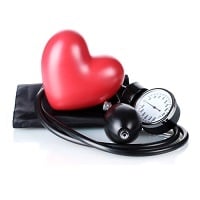
Like many important questions, this doesn’t have a short answer: blood pressure is essential to your survival. Without it, you’d die quickly. And high blood pressure in short bursts is good too. But when it’s too high for too long, it becomes dangerous.
Your body is an ingenious machine and one of the reasons it works so well is because your blood pressure is able to fluctuate. If you’re on the run from an attacking dog, it shoots up, ensuring you have the oxygen you need to make your getaway.
But when you’re fast asleep, it’s safe for your blood pressure to drop. This gives your blood vessels an opportunity to relax, enabling them to retain their elasticity.
If a rubber band is permanently stretched, it’ll eventually become inflexible or tear. In the same way, your body benefits from exercise that pushes up your blood pressure, and then has time to rest.
When your blood pressure remains high, it can lead to a number of problems, including:
- Heart attack: The heart is the pump that propels oxygenated blood through the arteries; it also has his own system of blood vessels. When an artery in the heart itself becomes blocked, the heart is unable to function properly. This triggers heart pains, or angina, and when the blood flow is stopped completely, it may trigger a heart attack.
- Kidney damage: Every efficient machine needs a filtration system, and your body is no exception. But prolonged high blood pressure damages the arteries, making them stiff and inflexible. When this happens, the kidneys are able to filter less fluid, leading to an accumulation of waste products in the blood. If the damage to the arteries is serious enough it may cause kidney failure, requiring dialysis or a kidney transplant.
- Arteriosclerosis: Consistently high blood pressure eventually damages arteries by reducing their flexibility and allowing for the buildup of fats and cholesterol. If this results in a blockage in the artery it can trigger a stroke or a heart attack.
- Stroke: Narrowed arteries increase the danger posed by clots in the bloodstream. If the clot blocks an artery it’s called a thrombotic stroke, and if it causes a weakened artery to rupture it’s called a haemorrhagic stroke.
- Enlarged heart: The extra load placed on the heart by a prolonged increase in blood pressure can eventually cause the heart muscle to become thickened and stretched. Failure of the heart to pump properly results in an accumulation of fluid in the lungs.




 Publications
Publications
 Partners
Partners










